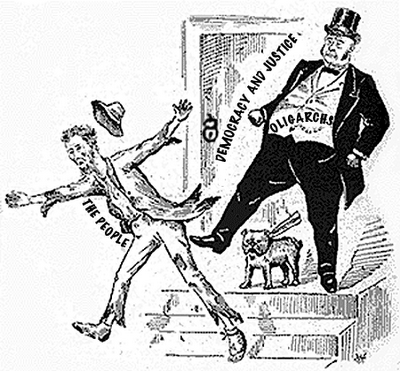
VANITY FAIR: Millions of Americans hoped President Obama would nominate Elizabeth Warren to head the consumer financial watchdog agency she had created. Instead, she was pushed aside. As Warren kicks off her run for Scott Brown’s Senate seat in Massachusetts, Suzanna Andrews charts the Harvard professor’s emergence as a champion of the beleaguered middle class, and her fight against a powerful alliance of bankers, lobbyists, and politicians. MORE
RELATED: When the C.F.P.B. was first proposed to Congress, in early 2009, the Chamber of Commerce, the leading business lobbying group in the country, announced that it would “spend whatever it takes” to defeat the agency. According to the Center for Public Integrity, from 2009 through the beginning of 2010, it would be one of the biggest spenders among the more than 850 businesses and trade groups that together paid lobbyists $1.3  billion to fight financial reform. Although a Gallup poll in the fall of 2010 would show that 61 percent of Americans supported Dodd-Frank—which was designed to curb the risky bank activities that triggered the 2008 meltdown and the ensuing recession—the financial establishment would continue to attack it even after it became law on July 21, 2010.
billion to fight financial reform. Although a Gallup poll in the fall of 2010 would show that 61 percent of Americans supported Dodd-Frank—which was designed to curb the risky bank activities that triggered the 2008 meltdown and the ensuing recession—the financial establishment would continue to attack it even after it became law on July 21, 2010.
According to the Center for Responsive Politics, in 2010 the financial industry flooded Congress with 2,565 lobbyists. They were financed by the likes of the Financial Services Roundtable, which, according to the Center, paid lobbyists $7.5 million, and is on its way to spending as much or more this year. The Chamber of Commerce spent $132 million on lobbying Washington in 2010. The American Bankers Association spent $7.8 million. As for individual banks: JPMorgan Chase, which received $25 billion in TARP funds from taxpayers, spent nearly $14 million on lobbying during the 2009–10 election cycle; Goldman Sachs, which received more than $10 billion from taxpayers, spent $7.4 million; Citigroup, which was teetering on the brink of insolvency and received a $45 billion infusion, has paid more than $14 million to lobbyists since 2009. And none of this money includes the direct campaign donations these organizations, and their surrogates, made to members of Congress. MORE
RELATED: Whereas Obama’s numbers are tanking, his snub of Warren seems to have made her even more popular with progressive voters. The controversy boosted her name recognition, and progressives who’ve had it with Obama relish the thought of reclaiming the U.S. Senate seat held by Republican Scott Brown by (as the New York Times put it) “sending against him a woman who has won considerable acclaim and popularity among liberals for taking on the financial industry.” MORE
RELATED: Elizabeth Warren For Congress
